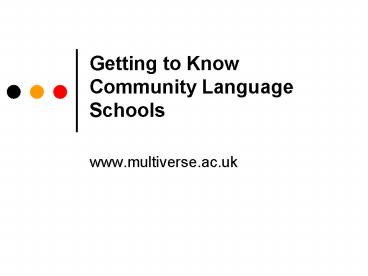Getting to Know Community Language Schools - PowerPoint PPT Presentation
1 / 19
Title:
Getting to Know Community Language Schools
Description:
The Bullock Report (1975) Para: 20.5: Immigrant children's attainment in tests and school in general is ... No child should be expected to cast off the language ... – PowerPoint PPT presentation
Number of Views:32
Avg rating:3.0/5.0
Title: Getting to Know Community Language Schools
1
Getting to Know Community Language Schools
- www.multiverse.ac.uk
2
First Questions
- What are Community Language Schools?
3
First Questions
- Why focus on something like community language
schools that exist outside mainstream schools?
4
The Bullock Report (1975)
- Para 20.5 Immigrant childrens attainment in
tests and school in general is related not only
to language but to several other issues,
particularly those of cultural identity and
cultural knowledge. No child should be expected
to cast off the language and culture of the home
as he sic crosses the school threshold, nor to
live and act as though school and home represent
two totally separate and different cultures which
have to be kept firmly apart. The curriculum
should reflect many elements of that part of life
which a child lives outside the school. (DES
1975, p. 286)
5
Working together with community language schools
- Helps to foster stronger and more positive
relationships between mainstream schools and
diverse linguistic and minority ethnic
communities. - The Race Relations (Amendment) Act 2002 lays a
duty on all public organisations, such as
universities and schools, to positively promote
good relations between different ethnic
communities.
6
The DfES defines a cohesive community as
- there is a common vision and a sense of belonging
for all communities - the diversity of peoples different backgrounds
and circumstances is appreciated and positively
valued - those from different backgrounds have similar
life opportunities - and strong and positive relationships are being
developed between people from different
backgrounds in the workplace, in schools and
within neighbourhoods (DfES, 2004, n.p.)
7
When were community language schools established?
8
Here is Aumie remembering his own community
language school in London in the 1930s
- At the age of 7, we were learning Hebrew grammar,
which is far more complicated in many ways than
English grammar, so when we were in the English
school, adjectives, nouns and verbs, things which
non-Jewish friends just would be beginning to
grapple with, were all very natural to us. Maybe,
in some ways, it gave us an advantage in that we
were aware that language had a structure. In
Hebrew, you see, you have the root of a word
you could have one word in Hebrew which then
translated would be five words in English. So,
even as 7-year olds those of us who were
competent in Hebrew already had a sound
grammatical basis when we looked at English
grammar. (Gregory and Williams, 2000, p. 91)
9
In the 1960s a new type of community school,
supplementary school, was established for and
by the African-Caribbean community
- Aimed at raising the mainstream school
achievement of African-Caribbean children. - Focus on teaching and supplementing English,
English literacy, numeracy and Science - Also including aspects of African-Caribbean
culture, language and history in its curriculum.
10
Schools Minister Andrew Adonis recognises the
achievement of community language schools, for
example
- the Hellenic School in Barnet London where
more than half of students did well in their AS
and A-level exams in Greek the Somali
supplementary school in Kensington Chelsea
London which provides national curriculum
support for children aged to six to 16 close
partnerships between supplementary schools and
mainstream schools such as Oldknow Junior School
in Birmingham and Mauldeath Road Primary School
in Manchester. (DfES Press Release 21 April 2006)
11
Where can I find out about my local community
language schools?
- www.resourceunit.com
- www.continyou.org.uk
12
When and where do they take place?
- Who funds them?
13
What happens in a community language school?
- Handout 1 - do this task now with the person
sitting next to you. - Handout 2 - see the overview of different
functions of a community language school.
14
What are the benefits for children and young
people?
15
1. Language Learning
- Children can study their own languages in formal
school contexts - often from the age of 3-4 years
onwards to 18 years. This contributes to the
pupils cognitive development. Additive
bilingualism brings about additional benefits.
(Subtractive bilingualism takes away confidence,
self esteem and aspects of identity.) - Portuguese pupils who attended community language
schools did better in their SATs than those who
did not (Barradas, Multiverse website) - Language lessons support older pupils
examinations such as GCSEs and AS and A-Levels. - (Adapted from Kenner, 2004)
16
2. Cultural Connections
- Benefits for children and adults for maintaining
links with their family and community heritage. - Creates a sense of belonging to a community.
- Enables a stronger sense of identity to be
constructed and maintained. - (Adapted from Kenner, 2004)
17
3. Reinforcing the Mainstream School Curriculum
- Additional support for mainstream school
learning, such as consolidating English literacy
and providing support for homework. - Support for national tests (formerly SATs).
- (Adapted from Kenner, 2004)
18
4. Broadening the Curriculum
- Additional music lessons and performances, such
as singing and learning to play a range of
musical instruments. - Dance lessons and performances.
- A different context and perspective for studying
history, citizenship, geography, RE. - (Adapted from Kenner, 2004)
19
More information on www.multiverse.ac.uk































